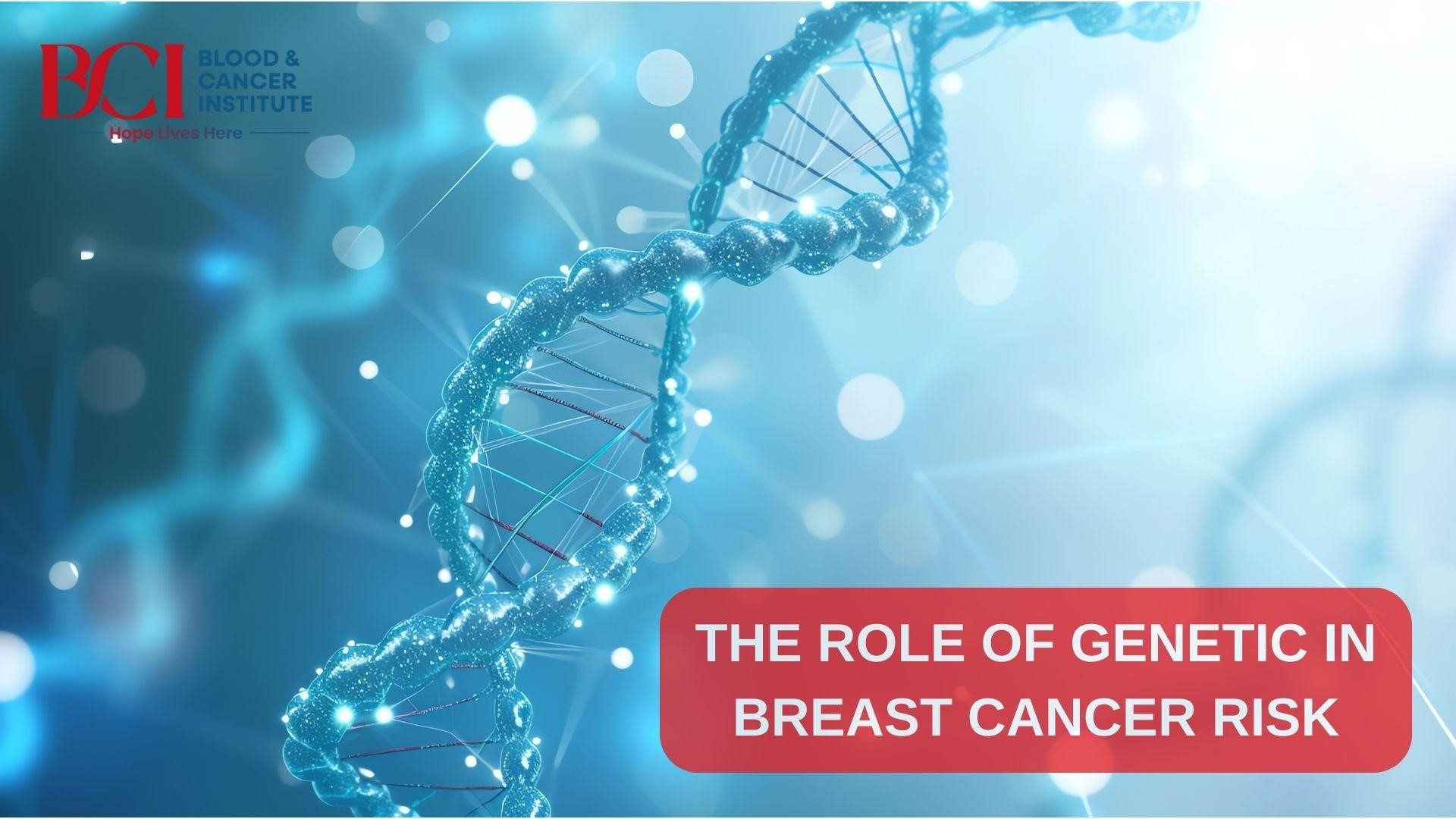
- By : BCI
- Blog
- Comments: 0
The Role of Genetics in Breast Cancer Risk: Explained By The Breast Cancer Specialist In Surat
Breast cancer is a significant health concern for women worldwide. In India, it's the most common cancer among women. Genetics play a crucial role in determining breast cancer risk. Understanding this link can empower you to take control of your health. In this blog post, our breast cancer specialists in Surat, at the Blood and Cancer Institute will help us in understanding the role of genetics and breast cancer occurrences. Let’s take a deep-dive:
What are genes?
Genes are instructions in our DNA. They determine our traits and influence our health. Some genes can increase the risk of certain diseases, including breast cancer.
How do genes affect breast cancer risk?
Certain gene mutations can raise your breast cancer risk. The most well-known are BRCA1 and BRCA2 mutations. According to cancer specialists in Surat, these genes normally help prevent cancer. When mutated, they can't do their job properly.
Women with BRCA mutations have a much higher risk of breast cancer. They're also more likely to develop it at a younger age. Other genes can also influence breast cancer risk, but to a lesser extent.
Are genetic mutations common?
BRCA mutations are relatively rare. They affect about 1 in 400 people in the general population. However, they're more common in certain ethnic groups. In India, the prevalence of BRCA mutations varies. Some studies suggest it may be higher in certain communities. More research is needed to understand the full picture.
Is breast cancer always genetic?
No, not all breast cancers are genetic. Only about 5-10% of breast cancers are due to inherited gene mutations. Most cases occur in women with no family history of the disease.
However, having a family history does increase your risk. This is especially true if a close relative had breast cancer at a young age.
Should you get genetic testing?
Genetic testing can reveal if you carry high-risk mutations. However, it's not necessary for everyone. You can consider testing if you have:
- A strong family history of breast or ovarian cancer
- A relative with a known BRCA mutation
- Breast cancer diagnosed at a young age
- Triple-negative breast cancer
- Ashkenazi Jewish ancestry
Speak to a genetic counsellor or healthcare provider. They can help you decide if testing is right for you.
What if you test positive?
A positive test doesn't mean you'll definitely get cancer. It means you have a higher risk. You can take steps to manage this risk:
- More frequent screenings
- Preventive medications
- Risk-reducing surgeries
These options have pros and cons. Discuss them thoroughly with experts consulting at the best cancer hospital in Surat.
What if you test negative?
A negative test is reassuring. However, it doesn't mean you have no risk. You can still develop breast cancer. Continue with regular screenings and a healthy lifestyle.
Can you reduce your genetic risk?
You can't change your genes. But you can lower your overall breast cancer risk:
- Maintain a healthy weight
- Exercise regularly
- Limit alcohol consumption
- Avoid smoking
- Breastfeed if possible
Our breast cancer specialist in Surat at BCI- Blood and Cancer Institute says that these habits benefit all women, regardless of genetic risk.
What about traditional medicine?
Many women in India use traditional remedies. Some may have health benefits. However, they're not proven to prevent breast cancer. Don't rely on them as your only protection.
Is genetic testing available in India?
Yes, genetic testing is available in major Indian cities. However, it can be expensive. Some hospitals offer it as part of their cancer care programs. Check with local healthcare providers for options.
Are there support groups?
Yes, there are breast cancer support groups in many Indian cities. Your healthcare team or patients seeking cancer treatment in Surat can easily guide you to these groups. These support groups can provide valuable emotional support and practical advice. Ask your healthcare provider for recommendations.
The Takeaway:
Genetics play a significant role in breast cancer risk. But they're not the whole story. Most breast cancers aren't caused by inherited mutations.
Know your family history. Discuss your risk with your doctor. Consider genetic testing if recommended. But remember, lifestyle choices matter too.
Stay informed. Get regular check-ups. Practice breast self-exams. These steps can help detect breast cancer early, when it's most treatable.
Your genes are just one piece of the puzzle. You have the power to influence many aspects of your health. Take charge of what you can control.
Breast cancer research is ongoing. New discoveries are made regularly. Stay tuned to reputable health sources for the latest information.
Genetics and breast cancer can be complex topics. Don't hesitate to ask questions. Seek second opinions if needed. You're your own best advocate.
Lastly, support other women in your community. Share knowledge. Encourage screenings. Together, we can make a difference in the fight against breast cancer.
